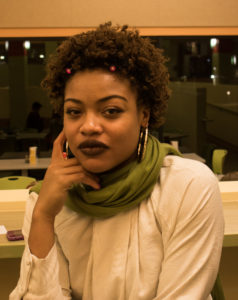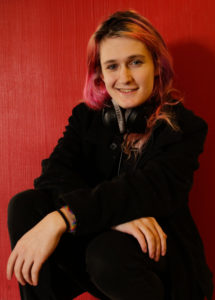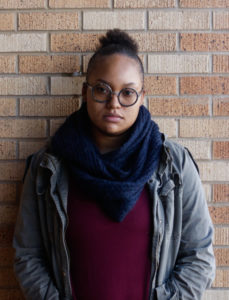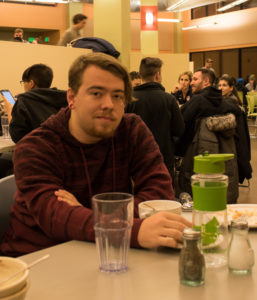Tags
Related Posts
Share This
SFUAD Students React to Trump Inauguration

Contemporary Music senior Rachel Dupard responds to the inauguration before heading out. Photo by Jesus Trujillo.
On Jan 20, Donald Trump was inaugurated into the White House as the 45th President of the United States of America. SFUAD students had a lot to say about the new president, his inauguration and the U.S. government moving forward in what many consider a dark time in our country’s history.

Film Freshman Kei Cypher responds to President Trump’s Inauguration. Photo by Jesus Trujillo
While each student Jackalope Magazine spoke with were more or less against Trump, they seemed divided in terms of reactions to the inauguration. There even were different views on whether to watch the ceremony. “I refused to watch it… I turned on anything else I could turned on,” says Junior Theatre major Vic Bell. Bell didn’t want to give the ceremony any ratings, a feeling many other Americans, including members of Congress, share.
Film major Kei Cypher said that while they understood why some decided not to tune in, Cypher personally decided to. “I did watch it in hopes that I would be able to know what was coming. In the same way that if were I living in Nazi Germany I would watch Hitler’s speeches… or if I were living in Russia I would watch Putin…,” Cypher says. “While I may not agree with them, and I certainly don’t want to be seen as though I support them, it is important to know what is being said in order to be able to combat forces of tyranny.”
Regardless of whether students decided to watch the inauguration or not, everyone seemed to have something to say about it. “It’s always exciting to watch big events like that but it was also kind of depressing because it seemed like we took so many steps forward with President Obama. [With Trump] it’s like a slap in the face and then ten steps back,” says Theatre Tech major Courtney Brandt.
Others had a more visceral reaction to the inauguration. “I felt like I was watching the world about to collapse,” says Contemporary Music sophomore Cleo Daniels, going on to say that the ceremony “didn’t feel real. It felt like I was in a dream.” Others agree with Daniels. “The inauguration was frightening,” says Cypher, citing the religious nature as one of the most unsettling aspects of the ceremony. “While many inaugurations throughout history– in fact I would say all of them– have had some sort of religious undertones or overtones to them, this one was particularly forceful in that. It felt more like a church service rather than an inauguration ceremony.” The inauguration opened with three religious speakers, one Catholic and two evangelical Christians. Six clergymen were invited to the inauguration. Trump’s own speech had religious overtones, stating that the country “will be protected by God.”

Sophomore Music major Cleo Daniels reacting to President Trump’s Inauguration. Photo by Jesus Trujillo.
Trump said in his speech that he plans to pull out of other countries and put “only America First.” Students had a variety of thoughts on this subject. While some felt it was nationalist, others were conflicted. “It could be a good thing but also could not be because we do give a lot of aid to other countries but we also have a lot of military interests in other countries,” says Film junior Haley Joy Porter. Other students felt that it was hypocritical for Trump to say he wants to put America first when so many of his former company’s products are made in countries such as China and Indonesia.
Students also had different reactions to Trump’s claim that “When you open your heart to patriotism, there is no room for prejudice.” Most outright laughed upon hearing the quote. “If he really believed that he wouldn’t have run on a platform of racism and intolerance,” says senior Creative Writing and Literature major Nicholas Thomas.
Others disagreed. Senior Contemporary Music major Rachel Dupard says that Trump, “does say sometimes what he means and sometimes he has to say what he says for the public. I think in this circumstance he probably does mean that…t’s just sometimes his actions and his words are very different.”

Nicholas Thomas, Creative Writing major, responds to the Inauguration during dinner in the Cafe. Photo by Jesus Trujillo.
A third opinion was that Trump was correct about the correlation between patriotism and non-prejudice, but that Trump may be confused about what it means to be patriotic. “When you open your heart to patriotism, there certainly is no room for prejudice,” Cypher says. “However, one of the things Trump often does is confuse patriotism with nationalism. Patriotism would say ‘Hey, we’re going to build the greatest country together… where nationalism would sort of say the opposite, ‘Our country is the best country and therefore you have to build it the way I say you have to because we’re the best country,’ [which is] sort of in line with his American First rhetoric.”
While student reactions to the inauguration varied from begrudging acceptance to passionate rebellion, the student body seems to agree that the next four years will be complicated.






 Jackalope Magazine is the student magazine of Santa Fe University of Art and Design. Building on the interdisciplinary nature of our education, we aim to showcase the talent of our university and character of our city.
Jackalope Magazine is the student magazine of Santa Fe University of Art and Design. Building on the interdisciplinary nature of our education, we aim to showcase the talent of our university and character of our city.
Recent Comments